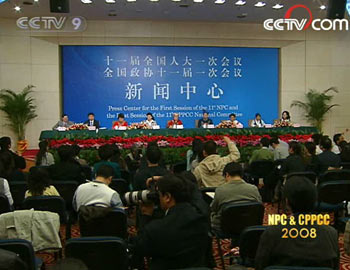The ongoing NPC session sees the involvement of deputies from all of China's ethnic groups. On Sunday, eight of the minority NPC deputies met with the press to voice their concerns.
|

|
|
The ongoing NPC session sees theinvolvement of deputies from all of China's ethnic groups. On Sunday, eight of the minority NPC deputies met with the press to voice their concerns. |
Attention was first drawn to their unique attire the minority NPC deputies took family photos at the request of reporters.
But concerns over social, economic and cultural development in their regions dominated the event.
Responding to questions about the equality of ethnic groups, the deputy from Xinjiang Uygur Autonomous Region cited its special family planning policy, and her own personal experience.
Deputy Zulifeiya Abudukader from Uygur ethnic group said, "Both Han and minority languages are used and studied in all schools across the autonomous region. In Xinjiang, minority people can have two children, just as I have. In southern Xinjiang, people can have three children, and if they are all girls, they can have a fourth child. Officials from both Han and minority groups are equal. They get along well, which lays the foundation for development in the region."
Primary school teacher, Baobulu, who represents the over 20,000 Jino ethnic group from Yunnan Province, called for stepped-up attention on education for the minority population.
Tibetan deputy Gusang Zhuolgar said the opening of the Qinghai-Tibet railway helps Tibetans economically and in education.
Zhang Jiachun, a deputy from the Sui ethnic group, displayed his people's culture by wearing clothes embroidered with horsetails the handicraft listed as China's intangible cultural heritage. He also showed traditional Sui calligraphy, which read "let the world know the Sui ideograph".
(CCTV March 11, 2008)